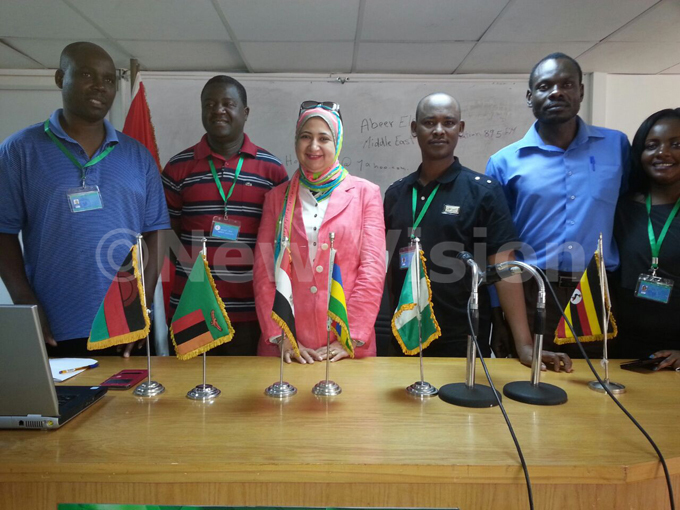Tell Africa's own story if Africa is to unite and develop
While closing a month-long training in Cairo, the capital of Egypt, on behalf of the Supreme Council for Media Regulation, the chairman of the training committee at the Training and Media Studies Centre, Saleh Elsalhi urged the journalists who underwent a vigorous training session to amicably solve the continent’s problem by telling its own stories.
With nearly a population of a billion people living in Africa, the rate under which the continent is falling apart is alarming more so with developmental programmes that will ensure its sustainability.
The devastating issues as portrayed in the western media indicate that Africa, the second largest continent is still reeled by the leadership of the continent's failure to have a vibrant media that is able to tell her own story that is educative and informative to the society and to the rest of the world.
Africa has suffered a big blow from the western media as it has been persistently portrayed as a continent full of problems ranging from conflict, poverty and diseases and yet Africa is endowed with natural resources that would help us to kick-off to development.

While closing a month-long training in Cairo, the capital of Egypt, on behalf of the Supreme Council for Media Regulation, the chairman of the training committee at the Training and Media Studies Centre, Saleh Elsalhi urged the journalists who underwent a vigorous training session to amicably solve the continent's problem by telling its own stories.
Elsalhi wondered why prominent media organizations in the world cannot report on the development programmes Africa is implementing but chooses to focus on only one negative side.
He emphasized to the journalists to stick to professional ethics of the media industry such as accuracy, balance (being non-bias), objectivity while at the same time, holding the leadership accountable for the actions.
The training drew seventeen seasoned journalists across the Anglophone speaking countries that include: Uganda, Nigeria, Malawi, Zambia, Botswana, Namibia, Ethiopia and Eritrea.
The ninth advanced training for Anglophone media communicators tackled a range of issues that once implemented will help to alleviate the information draught that has hit Africa as a continent.
Nasser Mohammed an experienced trainer took the youth journalists on the art of radio interview saying, "Many times, African journalists look naïve because they have failed to grasp the basic elements needed when conducting a radio interview. Radio interview is what has propelled the European and Western journalists to think that African know less in journalism."
He promised to lobby the government of Arab Republic of Egypt to come up with funding arrangements that will facilitate African journalists who cover the work in African Union (AU) in Addis Ababa, Ethiopia. Journalists' work must be recognized by every country that is leaping forward development.
Meanwhile, the director African Research Centre, Dr Hoda Zakaria lectured on the role of the media in unifying the African rank in international forums, saying Africa as a continent lags behind when it comes to issue presentation in the international meetings. "What the Western media portray about Africa is disastrous and unfit to be published in the media for it does not play the unifying role that the continent badly needs," she said.
The 9th edition of the training discussed how African journalists can come up with alternative platforms of Reuters, AFP and BBC that will unite them and ensure that they execute their duties with professionalism.
Africa has on recent posted high growth rates and increased foreign investment on the continent, something that has given rise to popular idea that Africa as a continent may well be on track to become the next global economic powerhouse.
This ‘African Rising' narrative has been most prominently presented in cover stories by Time Magazine and The Economist and yet both publications and Western media are wrong in their analysis of Africa's developmental prospects - and the reasons they are wrong speak volumes is portrayed in how the western media reports about how Africa is only a continent with problems.
Mohammed Shady, a trainer suggested that journalists form African News Wrap where Africa's developmental stories are published so that when a country like Uganda achieves higher GDP growth rates and increased trade volumes, then we should be able to report about such developments positively with a view of creating awareness to the world.
He said the failure to do that by African media renders African's efforts spurious. Mohammed Shady added that the responsibility of sticking to the truth while reporting provides a more comprehensive picture in the process of report analysis and different skills of recording an educative and informative news that will sell the continent to the whole world.
The journalists expressed deep appreciation for the offer that the government of Egypt through the vibrant leadership the concerned staff in the ministry of information by coming up with lucrative training sessions that will bolster strong media on the continent.
In the journalists' written speech to the Supreme Council and Media Regulation it said, "Egypt as an African country has played and its continuing to play a positive and an important role in supporting African journalists to further their training on various aspects of media".
The chairman of the Supreme Council for Media Regulation, Saleh Elsalhi said, "The Government of the Arab Republic of Egypt launched this training sessions where African journalists are trained since 1977 and since then it has never looked back. As a country, we have a big and every important role to help our continent through furthering the education of our media practitioners."
However, it's needful to note that the Government of Egypt does not only train African journalists and media practitioners, they train many professionals from various fields in the continent that are key to the development of a country and this include; police officers, military officers, medical personnel and other civil servants.